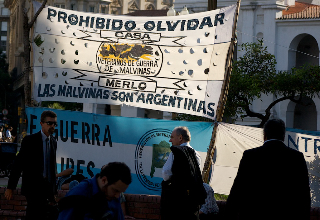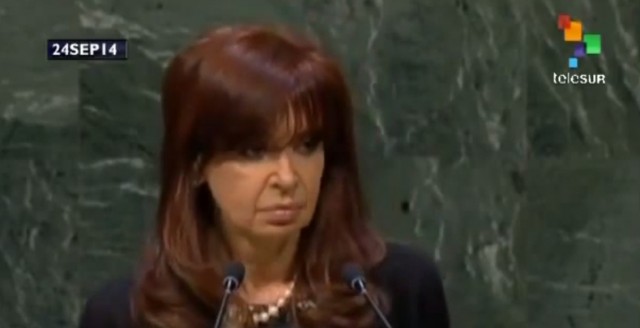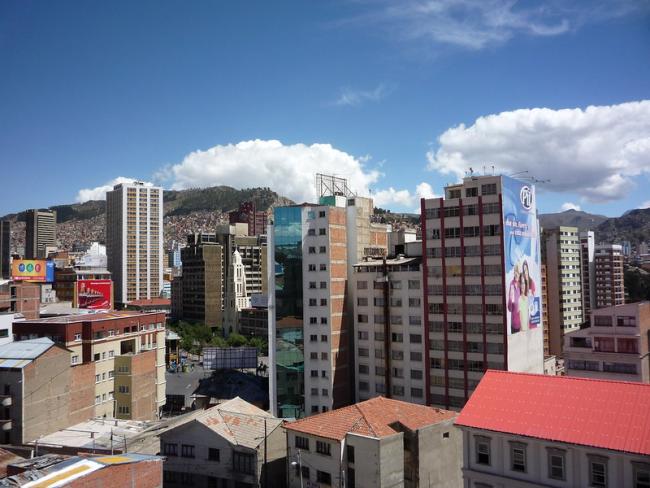
Argentina, Features
Falkland Islands Oil Dispute Raises Old Issues and New Problems
March 8, 2010 By Joel Richards

A memorial in Buenos Aires to the Argentine soldiers who died in the war with Britain over the Falkland Islands. Photo by Joel Richards.
BUENOS AIRES — The long-standing row between Argentina and Britain over the Falkland Islands has, once again, made the front pages. Britain’s decision to begin drilling for oil just off the islands has sparked an angry response in Argentina, whose government claims sovereignty over the Falklands.
While the two nations look to build up regional and international support for their case, the issue also stirs up memories of those involved in the war in 1982, during which 649 Argentines lost their lives, while Britain sustained 255 casualties.
“The oil rig is 400 km from Santa Cruz, in Patagonia,” said Luis Giannini, 48, in the Plaza de Mayo in Buenos Aires. “What’s next? They’ll be after the Antarctic, they’ll take Patagonia, they’ll be after the water.”
Giannini is a salesman, married with two daughters and considers himself a veteran of the 1982 war, but is not acknowledged by the Argentine state as having fought. “It was the South Atlantic Conflict,” he points out, “not the Malvinas War.”
Like 8,000 other soldiers, Giannini was sent to Patagonia during the war and was on standby. “Members of my regiment went to the islands, but not me. That doesn’t mean I didn’t suffer.”
A group of war veterans, of which Giannini is a member, have been camped in the Plaza de Mayo for the past two years, demanding the government recognizes their participation in the war, and include them in the $600 monthly state pension for combatants.
“They never tell the other story, that people died on the mainland, that there was fighting there, that the British were also on the mainland,” he said. “We were involved in the war, even though we were stationed on the mainland.”

Soldiers demand to be classified as veterans of the Falkland Islands war at a protest in the Plaza de Mayo, Buenos Aires. Photo by Joel Richards.
Giannini says that those who were on standby in Argentina suffered the same consequences after the war. “It’s not that we had little to eat,” he said, remembering the conditions of the soldiers. “It’s that we didn’t eat.”
During the 74-day war, he says he lost 30 pounds. “I was 20 at the time. I lost my job when I got back to Buenos Aires. I was more aggressive, I had changed… I broke up with my girlfriend for two years until I sorted my head out. It’s not about who fought, who was on the islands, who lost a leg… We all took part. We all paid the price.”
He says that Argentina quickly wanted to forget about the veterans. “It was very difficult coming back after the war. People went through many different stages – they waved us off like heroes as we left to go and fight for the country. Then once it ended, we shouldered the blame for the defeat.”
Diplomacy and dictatorship
When Argentina and Britain went to war, the conflict was viewed as a political maneuver to save both regimes, as much as a territorial dispute. Britain’s Conservative leader Margaret Thatcher faced some of the worst approval ratings of any prime minister in modern British history. Argentine General Leopoldo Galtieri, meanwhile, was the de facto president of a military junta that was losing legitimacy amid grave accusations of human rights abuses and gross economic mismanagement.
“It was a really tough time,” Giannini said, “It wasn’t the country that I wanted to grow up in and live my life in. People were being disappeared,” he said. “Two days before Argentina landed in Malvinas, there was a huge anti-government demonstration. I was there, with thousands more. The police came in and were hitting us all. I had left the army, but was then drafted in a few days later.”
While Giannini talks, one of the emblematic groups of the human rights resistance movement, the Mothers of the Plaza de Mayo, march around the square. The Madres, as they are known, have long campaigned for justice and truth about the infamous desaparecidos, and along with other human rights groups support the soldiers’ struggle for recognition and rights as war veterans.
For the current government of Cristina Fernández de Kirchner, however, the priority is the current situation in the islands, not dealing with the 28-year old demands from combatants.
At the recent Rio Group meeting in Mexico last month, where 23 Latin American and Caribbean nations met, the region fully backed Argentina’s claim for sovereignty over the islands.
Venezuelan leader Hugo Chávez called on the “Queen of England” to do something. “The time for empires is over, haven’t you noticed? Return the Malvinas to the Argentine people.”
Brazilian President Luiz Inácio Lula da Silva grabbed fewer headlines, but succinctly summarized the fundamental issues behind the stand-off with the rhetorical question, “what is the geographical, the political or the economic explanation for the U.K. to be in Las Malvinas?”
Oil dispute
The recent diplomatic row between Argentina and Great Britain was triggered by the decision to drill for oil. Initial research points to a possible 3.5 billion to 60 billion barrels of oil lying under the ocean surrounding the islands.
In 1995, Argentina and Britain signed a joint declaration accord over the islands, specifically addressing oil, fishing and conservation issues. In 2007, Argentina pulled out of what it said was “unilateral action” by the U.K. in granting 25-year fishing licenses, which bring in around $30 million and funds the islands’ services.
The recent decision to send an oil rig belonging to the appropriately-named company, Desire Petroleum, and begin drilling 60 miles off the coast of the islands incensed the Argentine government, which ordered restrictions on ships travelling from the mainland to the islands.
The early rhetoric from the British government raised the temperature, with Prime Minister Gordon Brown promising to protect the islands residents. The British media was quick to blame Argentina for intensifying the tension. “Once again,” wrote The Economist, “an Argentine government is making aggressive noises towards the Falkland Islands.”
In Argentina, meanwhile, the press highlighted the current political climate in the U.K., as with elections due in May, the dispute is viewed as helping Gordon Brown and his Labour Party. “In London the Falklands Effect is still talked about as helping the Thatcher government,” wrote the national paper Crítica, adding that “Brown did not hesitate from day one to be hostile over the issue.”
The Falkland Islanders, meanwhile, are resolutely anti-Argentine.
“It is time that Argentina recognised the Islanders and their democratically elected government,” wrote Falkland Islands representative to London, Sukey Cameron, in The Times.
“We are no longer a British colony, but a self-governing overseas territory with full rights of self-determination. We have chosen to remain British citizens,” she wrote, while defending their right to remain where they have lived for 180 years, “We will not be bullied into submission.”
The residents received backing from the UK government; with the Deputy Labour leader Harriet Harman declaring that the islands will be “fully defended.”
From Argentina’s point of view, there is little discussion of allowing tensions to escalate into war. Since the return to democracy in 1983, brought about in part by the failure in the Falklands War, the military has been reigned in for its human rights abuses and defense funding has been drastically cut.
“We are not talking about going to war, that’s just too crazy to even consider,” Giannini said, adding, “This has to be resolved diplomatically, it must be resolved. They must not rob another millimeter of land.”
About Joel Richards
Joel moved to Spain after graduating from Glasgow University with an M.A. in Hispanic Studies. After four years as a sports journalist in Madrid, he moved to Buenos Aires, Argentina, where he is now based and works as a freelance journalist and T.V. producer.




6 Comments
“what is the geographical, the political or the economic explanation for the U.K. to be in Las Malvinas?”
Indeed what is the geographical, the political or the economic explanation for Argentina to be in the Falkland Islands? The islands have been claimed by Britain since the 17th century and Argentinian garrisons have been ejected in 1833 and 1982 for trespassing.
The British claim stands both historically, de jure and de facto. The islanders wish to remain British and are self governing. End of story.
Perdon,como que es la geografiao, la explicacion economica de Argentina?
las islas estan en la misma plataforma maritima y las riquesas de las aguas nos pertenecen.
Reclamo de Gran Bretaña? si el 99 % de los Ingleses no sabia donde carajo quedaban las islas hasta el conflicto
Preguntale a los isleños donde estudiaban o en que hospitales,se hacian atender antes del conflicto,cuando a Gran Bretaña no les interesaba un pito
de sus vidas.
Una buena medida cuando recuperamos LAS MALVINAS en 1982, era haber mandado a todos los isleños a su querida Gran Bretaña
Fueron y seguiran siendo PIRATAS y los isleños OCUPAS.
ESE SERIA EL FIN DE LA HISTORIA
Gosh! After all this years we still fight for this. I can not believe it. Argentina have rights over the islans because they’re under our ocean territory. It’s common that we claim ours right there. But it’s also true that the islanders say they want to contineu being under the power of britian. Why we can not have a pacific solution? or better, they are two islands one for argentina and the other for England. THAT would be an END OF THE STORY
esa es la solucioon! una isla para cada pais, aunque estoy en desacuerdo en un monton de cosas y no seria lo correcto, pero para que finalice el problema esa seria la mejor SOLUCION! BASTA DE GERRAS MUNDO, SOMOS PERSONAS Y DEBEMOS AYUDARNOS! SEAMOS DEL PAIS QUE SEAMOS!!!
The Malvinas are 300 miles of the coast of Argentina, The Falkland’s are 8000 miles of the coast of Britain. Enough said.
Despite the morality of using violence to achieve personal or political aims, the fact remains that Countries exist because of wars fought against their neighbours or rivals. Independence is largely secured through the employment of armed forces and the willingness to fight if threatened, this alone prepares us all for such an eventuality.
I commend you on your site it contains a lot of quality information and is well done.
Comments are closed.